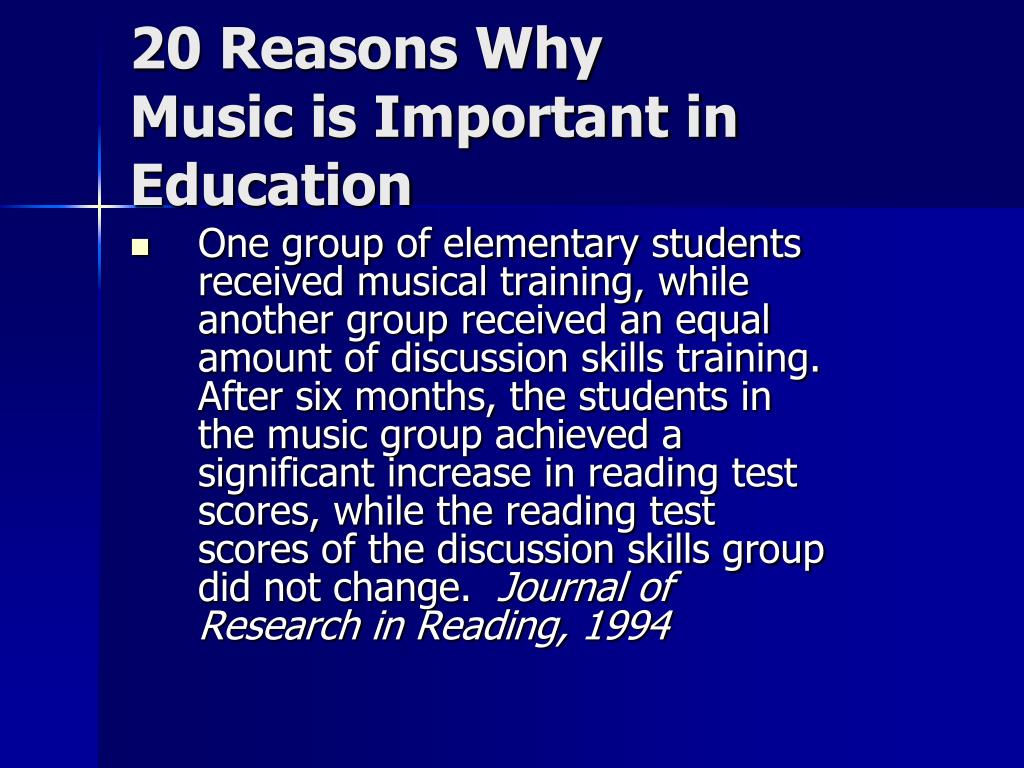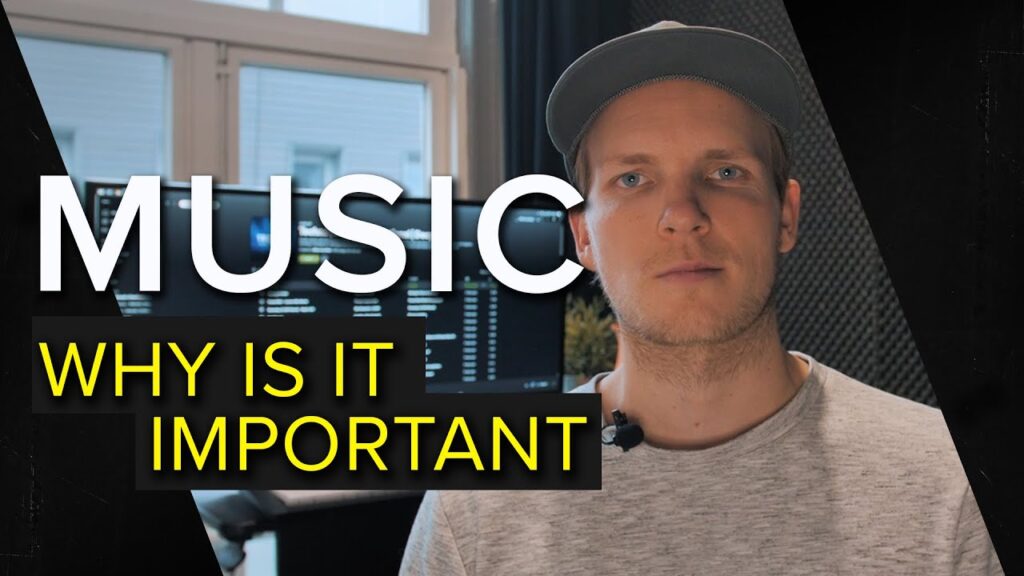Music holds immense importance in our society for various reasons. It is a universal language that can be understood and enjoyed by anyone, transcending cultural and linguistic barriers. Throughout history, music has been an integral part of human life, bringing people together and fostering a sense of connection. Not only does music serve as a form of entertainment and art, but it also provides a means for individuals to express themselves and alleviate stress and anxiety. Additionally, music holds great significance in marking special occasions and gatherings, creating lasting memories. Furthermore, music has the power to enhance our workouts, motivating and inspiring us to push ourselves further. Overall, music plays a vital role in our society, bringing people together, representing diverse cultures, and enriching our lives in numerous ways.

Music is a universal language that can be understood by anyone
Music connects cultures
Many people believe that music is a universal language. This means that, regardless of what country someone is from, they will be able to understand and enjoy a song without knowing the lyrics. Since music doesn’t rely on words, it has the ability to connect two different cultures in a way that no other form of communication can. Music can break down boundaries, even where people don’t speak the same language. For example, someone from America can listen to a song from Japan or Brazil and still appreciate the melody, rhythm, and emotions conveyed through the music. This ability to connect through music helps foster understanding and appreciation of different cultures.
Music transcends language barriers
In addition to connecting cultures, music has the power to transcend language barriers. When someone listens to a song in a foreign language, they may not understand the lyrics, but they can still feel the emotions and enjoy the melody. Music expresses universal feelings and emotions that can be universally understood, regardless of the specific language being sung. This is why music is often played during international events or gatherings, as it serves as a common ground for people from different linguistic backgrounds to come together and enjoy a shared experience.
Music has been a prevalent part of human life for centuries
Music in early human civilizations
Music has been a very important part of human life for thousands of years. When early humans still lived in caves, it was very common for them to gather around the fire and sing songs with primitive instruments. This communal singing and dancing helped bring some harmony within the tribe’s community and helped people feel connected with one another. Music has been used for various purposes throughout history, including religious ceremonies, storytelling, and celebrating important events. The presence of musical instruments and artistic representations of music in ancient cave paintings and artifacts is evidence of its prevalence in early human civilizations.
Music as a cultural exchange
Throughout history, music has served as a means of cultural exchange. Whenever people migrate to a different area, they bring their own music along with them and add it to the local music. This cultural exchange through music has enriched societies and led to the creation of new genres and styles. For example, the influence of African rhythms and melodies in American jazz and blues music is a testament to the power of cultural exchange through music. Music acts as a bridge between different communities, allowing for the sharing of traditions, values, and perspectives.
Music is a form of entertainment and art
Music as a creative outlet
Aside from its function of bringing people together, music is also used for entertainment and artistic purposes by many cultures. Music can be a great outlet for people to express themselves creatively. It allows individuals to tap into their emotions and share their experiences with others through songwriting and performance. Many musicians use music as a means of self-expression, channeling their thoughts and feelings into their compositions. This creativity and expression through music provide a sense of fulfillment and satisfaction for both the artist and the listener.
Artistic value of music
Music is not only a form of entertainment but also an art form in its own right. Just like painting, sculpture, or dance, music has its own aesthetic qualities and artistic value. Composers and musicians carefully craft melodies, harmonies, and rhythms to create an emotional and intellectual experience for the listener. Music can evoke a wide range of emotions, from joy and excitement to sadness and contemplation. It can transport listeners to different places and times, capturing the essence of a moment or a story. The artistic value of music lies in its ability to stimulate the imagination and provoke thought and emotion.
Music brings people together
Music as a social activity
One of the most powerful aspects of music is its ability to bring people together socially. Whether it’s singing along with friends at a karaoke night or attending a live concert with thousands of fellow fans, music creates a sense of camaraderie and unity. Music provides a shared experience that transcends individual differences and unites people in a common bond. It encourages interaction and communication among people, fostering social connections and building relationships. Music can be a catalyst for building communities and creating a sense of belonging.
Music as a bonding tool
Music has the unique ability to connect people on an emotional level. It can serve as a catalyst for bonding between individuals. Think about how a couple might have “their song” that holds special meaning for their relationship, or how a group of friends might have a playlist that brings back memories of shared experiences. Music creates a sense of familiarity and nostalgia, which can strengthen relationships and deepen connections. It provides a common language through which people can communicate their emotions and experiences, fostering empathy and understanding.

Music helps people relax and get over anxiety/stress
Music as a stress-reliever
Everyone gets stressed or anxious from time to time, even if it’s not about school or work pressures. Some individuals use music as a way to calm themselves down when they’re feeling this way. The soothing melodies, gentle rhythms, and comforting lyrics of certain songs can help reduce stress and promote relaxation. Music has a way of engaging and distracting the mind, allowing for a temporary escape from worries and anxieties. It can create a peaceful atmosphere and help individuals find solace in the midst of a chaotic or overwhelming situation.
Music for relaxation
Music is often used as a tool for relaxation. Many people listen to their favorite songs when they’re in bed or taking a shower, as it can help them relax and unwind. Slow, soft, and melodic music has a relaxing effect on the body and mind, promoting a sense of calmness and tranquility. Some individuals use instrumental music or nature sounds to create a peaceful ambiance during meditation or yoga sessions. The soothing effects of music can release tension, reduce heart rate and blood pressure, and induce a state of relaxation and well-being.
Music can represent what is unique in a culture
Music as a reflection of culture
Music, in a way, is a reflection of what people think is unique about their culture. Different cultures have their own distinct musical styles, instruments, and lyrical themes that are rooted in their cultural heritage. For example, if someone from America listens to music from India, they can learn some things about Indian culture and tradition. Indian music often incorporates traditional instruments such as the sitar and tabla, and explores themes of spirituality and devotion. This exposure to different cultural music allows people to gain insights into the customs, values, and beliefs of different societies.
Interpreting the meaning of music
Music can have different meanings for different individuals and communities. A song might resonate with someone on a personal level, relating to their own experiences and emotions. Conversely, a song might carry a cultural or historical significance that is understood by a specific group of people. For example, if someone who is part of an exclusive club listens to a song, they may think it represents the group in some way. Since music can easily be interpreted in many different ways, it is always important to be open-minded and respectful of different interpretations. Music encourages individuals to explore and appreciate different perspectives and expand their understanding of the world.

Music is useful to mark special occasions and gatherings
Importance of music in celebrations
Music plays a vital role in celebrations and special occasions. From birthday parties to weddings, music sets the mood and enhances the overall atmosphere of the event. Festive and upbeat songs can create a sense of joy and excitement, while slow and romantic melodies can evoke a sense of intimacy and tenderness. Music helps create lasting memories and adds an extra layer of enjoyment to these important moments in life. Whether it’s dancing to a favorite tune or singing along to a familiar song, music elevates the experience and makes it even more memorable.
Music as a memory marker
Music has the remarkable ability to evoke memories and emotions from specific times in our lives. Certain songs become deeply associated with significant events, becoming a soundtrack to our memories. Hearing a song from our past can transport us back to a specific moment or period, triggering a flood of emotions and nostalgia. Music acts as a memory marker, preserving and encapsulating our experiences in a way that other forms of media cannot. This is why music is often used during memorial services or funerals to honor and remember the life of a loved one.
Music can improve our workouts
Music as a workout motivation
Music has a profound impact on our mood and energy levels, making it an effective tool for motivation during workouts. Many people listen to their favorite songs while they’re working out, as it can help them move faster and push themselves further during their exercise routine. Upbeat and energetic music can increase adrenaline levels and boost stamina, enabling individuals to perform at a higher intensity. The rhythm and tempo of the music can synchronize with the movements of the body, enhancing coordination and focus. Music can make workouts more enjoyable and provide a much-needed motivational boost.
Effects of music on physical performance
Studies have shown that music has measurable effects on physical performance. When listening to music during exercise, individuals tend to perceive less exertion and fatigue, allowing them to exercise for longer durations. Music has the ability to distract the mind from discomfort and pain, making the exercise feel more manageable. It can also enhance coordination and timing, improving movement efficiency. Additionally, music has been found to elevate mood and increase pleasure during workouts, leading to a more positive exercise experience. Incorporating music into workout routines can lead to improved performance and adherence to exercise regimens.

Music enhances cognitive development
The impact of music on brain function
Research has consistently shown that music has a positive impact on brain function, particularly in the areas of memory, attention, and language skills. Listening to music activates various regions of the brain, stimulating cognitive processes and promoting neural connectivity. Learning to play a musical instrument, in particular, has been linked to enhanced neural processing, improved motor coordination, and increased spatial-temporal skills. Music engages both hemispheres of the brain, fostering holistic brain development. This is why music education is often recommended for children, as it can enhance their overall cognitive abilities and academic performance.
Music as a tool for learning and memory
Music can be a powerful tool for learning and memory retention. The rhythmic patterns and melodic structures in music can help encode information in the brain, making it easier to recall and retain. This is why many educational programs incorporate music into their teaching methods, as it can facilitate the learning process and make it more enjoyable. Music can aid in the memorization of facts, foreign language vocabulary, and mathematical concepts. It can also improve listening skills and auditory processing, leading to enhanced communication abilities. The integration of music into educational settings can enhance cognitive development and foster a love for learning.
Music as a form of self-expression
Emotional expression through music
One of the most powerful aspects of music is its ability to express and evoke emotions. Music has the capacity to capture and convey a wide range of human emotions, from happiness and excitement to sadness and introspection. This emotional resonance allows individuals to use music as a form of self-expression, conveying their thoughts, feelings, and experiences in a way that words alone cannot. Listening to music that resonates with their emotions can provide individuals with a sense of validation, comfort, and understanding. Similarly, composing or performing music allows individuals to channel their innermost thoughts and emotions into their art, creating a deeply personal and expressive statement.
Music as a personal statement
Music has the power to reflect and communicate one’s identity and values. The songs that individuals resonate with and the genres they prefer can be reflective of their personality, beliefs, and experiences. For example, someone who enjoys punk rock music might resonate with its rebellious and counter-cultural ideals. Music can serve as a personal statement, allowing individuals to share their unique perspectives and experiences with others. Similarly, attending concerts or music festivals that align with their interests can provide individuals with a sense of community and belonging. Music allows for individuality and self-expression while promoting connection and understanding among like-minded individuals.
In conclusion, music is an incredibly important and universal part of our society. It has the power to connect cultures, transcend language barriers, and bring people together. Music has been a prevalent part of human life for centuries, serving as a form of entertainment, art, and cultural exchange. It helps people relax, cope with stress, and express themselves emotionally. Music serves as a reflection of culture and can mark special occasions and gatherings. It enhances workouts, improves cognitive development, and allows for personal expression. With its myriad benefits and universal appeal, music continues to play a significant role in shaping our society and enriching our lives.


